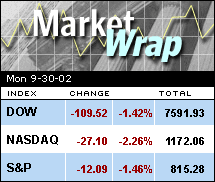NEW YORK (CNN/Money) -
U.S. stocks ended with more losses Monday, closing the book on the market's worst September since the Great Depression and the worst third quarter for the Dow industrials since 1987.

The day's session capped a second straight loss for the blue-chip index and the third straight quarterly losses for the Nasdaq composite and the S&P 500.
"Today was the end of the quarter and that helped the overall decline," Warren Meyers, NYSE member with Walter J. Dowd, told CNNfn's Street Sweep. "Overall, we're coming in week after week for about five to six weeks of negative news. Everyone is being optimistic about any number that comes out, hoping that will be the catalyst to stem the downside. But that hasn't happened."
The Dow Jones industrial average (down 109.52 to 7591.93, Charts) closed lower, though off its session lows, after a surprisingly weak manufacturing report startled investors. The tech-heavy Nasdaq composite (down 27.10 to 1172.06, Charts) and the Standard & Poor's 500 (down 12.09 to 815.28, Charts) also ended lower.

The Dow lost about 18 percent for the quarter and about 12 percent for the month. The Nasdaq lost almost 11 percent for September and 20 percent for the quarter, its fourth-worst third-quarter performance. The S&P suffered its worst third-quarter results since 1987, dropping about 18 percent for the quarter and 11 percent for the month.
While the Dow fell 11.1 percent in September 2001 as investors headed for the exits after the Sept. 11 terrorist attacks, the drop for September of this year was the worst for the world's most widely watched stock gauge since September 1931, according to Jeff Hirsch, editor and publisher of the Stock Trader's Almanac.
"[If this does not bode well today], it makes the risk of further declines high," Hirsch said.
| 
| |

| 
| 
|

|
 A look at best and worst performing sectors. CNNfn's Bertha Coombs wraps a rocky quarter. A look at best and worst performing sectors. CNNfn's Bertha Coombs wraps a rocky quarter.
|
|
Play video
(QuickTime, Real or Windows Media)
|
| 
|

|
|
Another bearish brokerage call for General Electric, combined with a sales warning from Wal-Mart, set the ball rolling for the Dow's declines early in the session. But a weak manufacturing report sealed the fate for the broader market.
Technology issues suffered following some cautious comments on business sentiment from Intel's CEO. Internet and wireless networking stocks also logged dips.
Tuesday's spotlight economic report is the Institute for Supply Management's key reading on the nation's manufacturing activity -- the Purchasing Managers' Index for September. Investors are likely to be somewhat skeptical after Monday's disappointing regional manufacturing data.
GE, Wal-Mart drag on the Dow
Merrill Lynch made a late-entry jump on to the bandwagon of brokerage firms turning negative on General Electric (GE: up $0.18 to $24.65, Research, Estimates). After several firms weighed in on the conglomerate last week, Merrill lowered its 2002 and 2003 earnings forecasts and slashed its price target on the stock to $28 from $35. But Merrill maintained a "buy" rating on the stock.
General Electric took the top slot as the most active stock on the New York Stock Exchange.

Among other Dow stocks of pain, Wal-Mart (WMT: down $2.00 to $49.24, Research, Estimates), the world's largest retailer, lowered its sales forecast for stores open at least a year -- same-store sales -- for the five weeks ending Oct. 4, but reaffirmed its guidance for the third quarter and year.
Intel's words of woe
Nasdaq stocks under pressure included No. 1 chipmaker Intel (INTC: down $0.73 to $13.89, Research, Estimates). CEO Craig Barrett said over the weekend that he does not expect a real turnaround in computer sales until companies return to profitability and start spending on technology.
Weakness spread through the entire tech sector, with bellwethers Cisco Systems (CSCO: down $0.75 to $10.48, Research, Estimates), Microsoft (MSFT: down $1.51 to $43.74, Research, Estimates), and IBM (IBM: down $2.05 to $58.31, Research, Estimates) dropping.
In the Internet arena, RBC Capital Markets downgraded Internet auction site eBay (EBAY: down $4.69 to $52.81, Research, Estimates) to "underperform" from "sector perform" and cut its stock price target to $45 from $70, citing disappointing demand and poor incremental traffic for stores among factors likely to inhibit business growth. Shares of the Internet stocks Yahoo! (YHOO: down $1.01 to $9.57, Research, Estimates) and Amazon.com (AMXN: Research, Estimates) came under pressure.
The wireless sector also got some bad news from Swedish wireless networker Ericsson (ERICY: down $0.05 to $0.36, Research, Estimates). The company warned it expects sales and orders in the third quarter to decline from the second quarter, citing reduced investments from customers.
Chicago brings out the bears
Hurting investors' already fragile sentiment, the National Association of Purchasing Management-Chicago's closely watched regional manufacturing index came in at 48.1 for September, far below the expected 53. Any reading below 50 indicates contraction in manufacturing.
The report came ahead of Tuesday's Institute of Supply Management's reading on the nation's manufacturing activity for the month of September, which is expected to show a slight improvement, rising to 51 from August's 50.5.
"The weaker manufacturing number does put the Federal Reserve [policy makers] in a position where they will have to ease interest rates," Michael Farr, president with Farr, Miller & Washington, told CNNfn'sMarket Call. "The market is in a downtrend here. Psychology is controlling the market here. We're embracing the bad news and discounting the good news."
The Fed last year cut interest rates 11 times in a bid to jump start growth. But at a meeting last week, the central bank decided to keep rates unchanged, although two policy makers dissented, arguing for a cut in borrowing costs.
But some market watchers offered another viewpoint.
"Easing rates will not improve the situation but increasing liquidity will," said Jon Burnham, portfolio manager for Burnham Funds. "The central bank needs to get money into the system. I think the economy has problems but it's not going into a depression. It's corporate America that's doing everything to undermine investor confidence. Corporate malfeasance is horrendous."
Burnham's analysis appeared to find some support from the country's economic think tanks.
In a poll of 32 prominent economists with the National Association for Business Economics (NABE), more than 80 percent predicted a healthy recovery for the U.S. economy and said there is little need for the Federal Reserve to cut interest rates further.
Meanwhile, the National Bureau of Economic Research (NBER) said over the weekend that the group may be getting closer to picking a month when the most recent recession ended -- assuming it has ended. The NBER said it's waiting to see reports such as the September jobs data, due Friday, that prove the economy did not slip back into a downturn.
"There's a saying that it's always darkest before dawn," Burnham added.
"It's not good news that we've broken through the July lows but analysts are pouncing on every stock, including the greatest names in the business such as General Electric. We've seen some unbelievably disappointing calls on some heavy-hitting names," Burnham said.
European markets tumbled to a losing close, while Asian-Pacific stocks also finished lower for the day.
Treasury prices rallied, with the 10-year note yield at 3.60 percent. The dollar slid against the yen and euro. The Japanese currency was buoyed by news that Japan's financial services minister Hakuo Yanagisawa was ousted in a move that also saw the resignation of the entire cabinet of finance ministers.
Light crude oil futures fell 9 cents to $30.45 a barrel in U.S. trading.
Market breadth was decidedly negative. On the New York Stock Exchange, decliners beat advancers 2-to-1 as 1.5 billion shares traded. On the Nasdaq, losers beat winners more than 2-to-1 as 1.6 billion shares changed hands.

|

